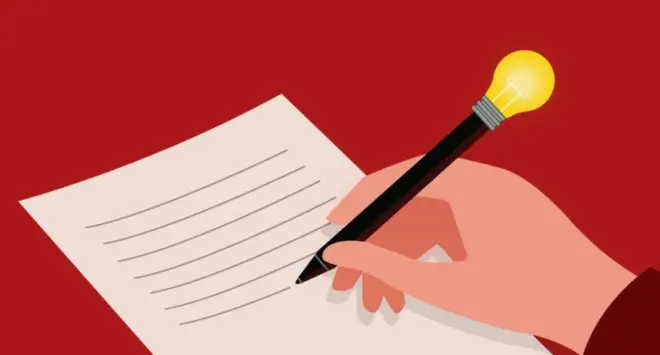《经济学人》双语:相比于键盘打字,手写笔记有哪些益处?
原文标题:
Johnson
The importance of handwriting is becoming better understood
Research on pens and paper highlights their benefits
约翰逊专栏
手写的重要性日益为人们所知
纸笔相关研究凸显了手写的益处
[Paragraph 1]
TWO
AND A HALF millennia ago, Socrates complained that writing would harm
students. With a way to store ideas permanently and externally, they
would no longer need to memorise.
2500年前,苏格拉底认为写作会对学生造成伤害。有了一种永久和外部存储思想的方法,他们就不再动脑记忆了。
It is tempting to dismiss him as an old man complaining about change.
我们很容易把他视为一个拒绝变化的老人。
Socrates did not have a stack of peer-reviewed science to make his case about the usefulness of learning concepts by heart. 苏格拉底可没有一大堆经过同行评议的科学论文,来证明用心记概念的实用性。

[Paragraph 2]
Today a different debate is raging about the dangers of another technology—computers—and the typing people do on them.
如今,人们对另一种技术——计算机以及在计算机上打字的危害性展开各种辩论。
As
primary-school pupils and PhD hopefuls return for a new school year in
the northern hemisphere, many will do so with a greater-than-ever
reliance on computers to take notes and write papers.
随着北半球开始了新学年,许多小学生和博士生们将更加依赖电脑来记笔记和写论文。
Some parents of younger students are dismayed that their children are not just encouraged but required to tote laptops to class.
令一些低年级学生家长感到惊愕的是,学校不仅鼓励并且还要求学生带着笔记本电脑去上课。
University professors complain of rampant distraction in classrooms, with students reading and messaging instead of listening to lectures.
大学教授们抱怨说,课堂上分心现象非常严重,学生们不是在听讲,而是在读无关内容和发短息。
[Paragraph 3]
A line of research shows the benefits of an “innovation” that predates computers: handwriting.
一项研究表明,早在电脑之前就有一种 "创新"--手写,手写有许多好处。
Studies have found that writing on paper can improve everything from recalling a random series of words to imparting a better conceptual grasp of complicated ideas.
研究发现,纸上书写可以带来的好处有:帮助记忆一系列随机排列的单词,更好地传授概念,更好地掌握复杂的理念等。
[Paragraph 4]
For learning material by rote, from the shapes of letters to the quirks
of English spelling, the benefits of using a pen or pencil lie in how
the motor and sensory memory of putting words on paper reinforces that
material.
对于需要重复记忆的学习材料,从字母的形状到英语拼写的怪异之处,使用钢笔或铅笔书的好处在于,书写过程中的动作和感官加强了该材料的记忆。
The arrangement of squiggles
on a page feeds into visual memory: people might remember a word they
wrote down in French class as being at the bottom-left on a page, par
exemple.
纸张上的不规则排列进入了视觉记忆:例如,人们可能会记得在法语课上写下的单词位于页面的左下角。
[Paragraph 5]
One of the best-demonstrated advantages of writing by hand seems to be in superior note-taking.
手写最明显的好处之一体现在记笔记上。
In
a study from 2014 by Pam Mueller and Danny Oppenheimer, students typing
wrote down almost twice as many words and more passages verbatim from lectures, suggesting they were not understanding so much as rapidly copying the material.
帕姆·穆勒和丹尼·奥本海默在 2014 年进行的一项研究中发现,学生们用键盘敲下的单词数量和逐字记录的短文数量几乎是授课内容的两倍,这表明他们不是在理解内容,而是在快速复制材料。
[Paragraph 6]
Handwriting—which
takes longer for nearly all university-level students—forces
note-takers to synthesise ideas into their own words. This aids
conceptual understanding at the moment of writing.
手写——即使对所有大学水平的学生来说,意味要花更长的时间——迫使记笔记的人将想法综合成自己的文字。这有助于在书写的过程中理解概念。
But those taking notes by hand also perform better on tests when students are later able to study from their notes.
但是,当学生用笔记进行复习时,那些手写笔记的学生的考试成绩更好。
The effect even persisted when the students who typed were explicitly instructed to rephrase the material in their own words.
当明确要求打字的学生用自己的话重新表述材料时,这种效果甚至依然存在。
The
instruction was “completely ineffective” at reducing verbatim
note-taking, the researchers note: they did not understand the material
so much as parrot it.
研究人员指出,这种指导在减少逐字记录方面 "完全无效":他们并没有理解材料,只是鹦鹉学舌。
[Paragraph 7]
Many studies have confirmed handwriting’s benefits, and policymakers have taken note.
许多研究已经证实了手写的益处,政策制定者也已经关注到这一点。
Though
America’s “Common Core” curriculum from 2010 does not require
handwriting instruction past first grade (roughly age six), about half
the states since then have mandated more teaching of it, thanks to campaigning by researchers and handwriting supporters.
虽然美国2010年的“共同核心”课程只要求对一年级(约6岁)以内学生进行手写教学,但由于研究人员和手写支持者的推动,自此之后大约有一半的州规定要进行更多的手写教学。
In Sweden there is a push for more handwriting and printed books and fewer devices.
在瑞典,有关部门在推动更多的手写和印刷书籍,提倡少用设备。
England’s national curriculum already prescribes teaching the rudiments of cursive by age seven.
英国的国家课程已经规定要给7岁学生教授“连笔”书写基本功。
[Paragraph 8]
However, several school systems in America have gone so far as to ban most laptops. This is too extreme.
然而,美国的一些学校系统甚至禁用笔记本电脑。这种做法过于极端。
Some students have disabilities that make handwriting especially hard. Nearly all will eventually need typing skills.
有些学生有残疾,导致手写特别困难。几乎所有学生最终都需要打字技能。
And
typing can improve the quality of writing: being able to get ideas down
quickly, before they are forgotten, can obviously be beneficial.
打字可以提高写作质量:在灵感消失之前快速记下想法,这显然是有益的。
So can slowing down the speed of typing, says Dr Oppenheimer.
奥本海默博士认为减慢打字速度也有益。
[Paragraph 9]
Virginia Berninger, emeritus professor of psychology at the University of Washington, is a longtime advocate of handwriting.
华盛顿大学心理学名誉教授弗吉尼亚·伯宁格是手写的长期倡导者。
But
she is not a purist; she says there are research-tested benefits for
“manuscript” print-style writing, for cursive (which allows greater
speed) but also for typing (which is good practice for composing
passages).
但她并不是一个纯粹主义者;她说,经过研究验证,“手稿”印刷风格的写作、连笔书写(速度更快)以及打字(这是写短文的练习好方法)都有好处。
Since
students spend more time on devices as they age, she argues for
occasional “tuning up” of handwriting in later school years.
随着年龄的增长,学生花在设备上的时间越来越多,因此她主张在后期学年中偶尔进行“手写的调整”。
[Paragraph 10]
Socrates may or may not have had a point about the downsides of writing.
苏格拉底关于书写弊端的观点也许有道理,也许没有。
But no one would remember, much less care, if his student Plato had not noted it down for the benefit of posterity.
但如果他的学生柏拉图没有把他的观点记录下来,后人不会记得,更不会关心。
(恭喜读完,本篇英语词汇量745左右)
原文出自:2023年9月9日《The Economist》Culture版块
精读笔记来源于:自由英语之路
本文翻译整理: Irene本文编辑校对: Irene
仅供个人英语学习交流使用。

【补充资料】(来自于网络)
苏格拉底(Socrates)是希腊古代哲学家之一,生活在公元前五世纪。他认为问题探究是人类最重要的任务之一,注重逻辑和推理,提出了一种基于对话和提问的思维方法,被称为“苏格拉底式提问法”或“反问法”。苏格拉底身体不高大,性格善良,处世平和,被认为是古代哲学的杰出代表之一。然而,苏格拉底的思想和方法与当时的政治和宗教权威产生了冲突,最终被指控煽动青年思想,并被判处死刑。
苏格拉底告诫学生不要相信文字,他说了这样一个故事。埃及的月神托特去拜访国王,向国王一一介绍“书写”这项发明的好处:书写是学习的一环,可以改善老百姓的记忆,我所发明的方法可以提供用他们记忆和智慧的秘诀。
可是国王却无动于衷。国王说:“如果我的子民学会了书写,就会把健忘植入灵魂深处,他们不会再练习使用他们的记忆,不再从心底将事物唤回记忆中,而只想靠着心外的那些标记。”国王进一步指出,托特发明的不是记忆的秘诀,而是提醒的秘诀;提供的不是智慧,而是智慧的假象。
“因为当你把一大堆东西灌输给他们,却没有教导他们半点东西,你会使他们看起来所之甚多,而其实对大部分事情一无所知。当人们不是充满智慧,而是装满着智慧的自负时,他们就会变成同胞的负担。”
【重点句子】(3个)
Today a different debate is raging about the dangers of another technology—computers—and the typing people do on them.
如今,人们对另一种技术——计算机以及在计算机上打字的危害性展开各种辩论。
One of the best-demonstrated advantages of writing by hand seems to be in superior note-taking.
手写最明显的好处之一体现在记笔记上。
And
typing can improve the quality of writing: being able to get ideas down
quickly, before they are forgotten, can obviously be beneficial.
打字可以提高写作质量:在灵感消失之前快速记下想法,这显然是有益的。


